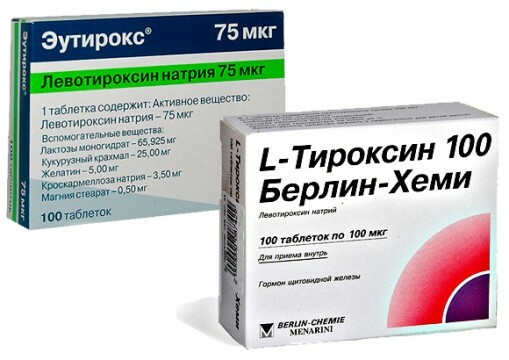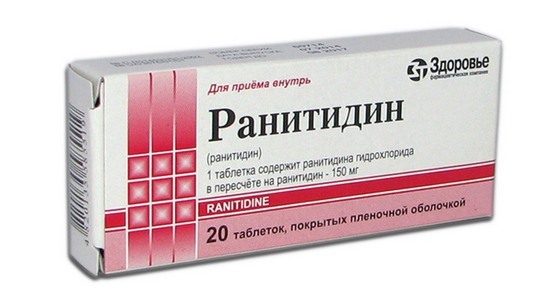Some diseases of the thyroid gland( endemic goiter, autoimmune thyroiditis) require the patient to take substitution therapy, since the body is not able to fully perform its endocrinological function and can not provide the body with a sufficient number of thyroid hormones.
The same problem is faced by patients who have suffered thyroidectomy with diffuse toxic goiter or thyroid cancer.
For the purpose of hormonal correction, doctors prescribe medications, the main components of which are the thyroid hormones .The main medicines of this group belong to L-thyroxine and eutirox. Here the patients have a question: which of these drugs is better? In this article we will try to help you understand this problem.
Indications for the prescription of medication

These medications are prescribed in the following cases:
- in goiter with normal thyroid function and hypothyroidism, regardless of the cause of the onset of the disease;
- as a substitution therapy after complete or partial removal of the gland;
- for the treatment of the effects of hypothyroidism, such as myxedema and cretinism;
- for malignant diseases, these drugs are used for suppression: increasing the level of thyroid hormones in the blood reduces the activity of the pituitary gland, so there is no excessive stimulation of the thyroid-stimulating hormone and the risk of tumor growth is reduced;
- together with other drugs to improve the effect of treatment of diffuse toxic goiter and autoimmune thyroiditis;
- for the treatment of congenital hypothyroidism;
- for carrying out thyroid suppression tests in differential diagnosis.
Similarities between L-thyroxine and eutirox
L-thyroxine and eutirox have several common characteristics:
- Composition: The main component of these medications is levothyroxine, a synthetic analogue of the human thyroid hormone. In the process of metabolism, levothyroxine is converted into lyotyronine and has an effect analogous to endogenous hormone. Also in the composition are various auxiliary substances. For example, lactose.
- The action of corresponds to the pharmacological effect of levothyroxine, which is why it is common for both drugs. They affect the metabolism, growth and development of body cells. The cardiovascular and central nervous system is stimulated, oxidative processes are activated, the need for tissues in oxygen increases, the cleavage of various substances is accelerated. Behind the feedback mechanism, the pituitary gland secretes less thyroid-stimulating hormone into the bloodstream.
- Admission rules: both doctors recommend taking the medicine on an empty stomach, thirty minutes before meals. The dose depends on the severity of the disease, the patient's age, the results of laboratory tests and the indices of thyroid activity.
- Both L-thyroxine and eutirox can be taken during pregnancy and lactation with .
- Symptoms of an overdose of are also common and correspond to the picture of an acute thyrotoxic crisis: patients complain of tachycardia, tremors of the limbs, a sense of cardiac disruptions, diarrhea, anxiety, sleep disorders, increased sweating. There is no specific antidote for elimination of levothyroxine, treatment is canceled and detoxication is prescribed, sometimes beta-blockers are possible.
- Interaction with other medical products is also the same. Levothyroxine increases the effect of taking anticoagulants and antidepressants. After using the drug, you need to review the dose of insulin and other antidiabetic drugs, since the need for them may increase. Also, the effectiveness of cardiac glycosides decreases. The simultaneous use of estrogens and levothyroxine increases the need for the latter. It is advisable to take a break between taking this medication and enveloping agents for a minimum of 4 hours.
- Both medicines can be stored for a long time - up to 3 years.
Differences

If you read the instructions superficially, it may seem that there are no differences between the preparations. But, if you study the topic in more detail, you can find some important differences.
- Side effects. When using L-thyroxine, unwanted effects occur only in the case of an incorrect dosage or violation of the administration rules. Perhaps an increase in appetite( as a result - an increase in body weight), hair loss, exacerbation of neurological diseases( especially epilepsy).Symptoms of hyperthyroidism( rapid heartbeat, insomnia, arrhythmias, tremors, increased feelings of anxiety), allergic reactions in the form of dermatitis. Eutirox has much fewer possible side effects: in rare cases, there is only an allergy to its individual components.
- Contraindications. Both drugs can not be administered to people with hypersensitivity to the components of the medication. You should also be cautious in case of thyrotoxicosis, adrenal diseases and heart diseases( arrhythmia, coronary heart disease, angina pectoris, myocarditis and pericarditis).Unlike eutirox, L-thyroxine should not be administered to patients older than 65 years of age. In turn, eutiroks need to be cautiously prescribed to patients with diabetes mellitus and malabsorption syndrome.
- Speed of appearance of results. Although both drugs show their effectiveness fairly quickly, it is commonly believed that L-thyroxine still acts faster. Clinical decrease in symptoms in patients with hypothyroidism is observed already on the 4th-5th day after the appointment, while to achieve the same effect from eutirox use it will take 7-12 days. Anyway, but a significant decrease in goiter in patients is observed in the same lines regardless of the type of drug, usually in 3-6 months.
- Form of issue. Drugs are available in the form of tablets for oral use and are sold in cardboard packs. The difference is that one blister of L-thyroxine contains 50 tablets, and eutirox is 25.
- Country of origin: eutiroks and L-thyroxine are manufactured in Germany, but the latter also has Russian counterparts.
Price comparison
The prices for these products may differ depending on:
- region where they are sold;
- release form;
- country of origin;
- the number of tablets in a pack.
It's even more important in which pharmacy you buy the medicine. In any case, the cost of L-thyroxine and eutirox is not much different and can range from 100 to 200 rubles. The cheapest way to order them through online pharmacies, there you can compare prices and choose the most acceptable option.
What is the best preparation?
Based on all of the above, we can conclude that most main difference is the presence of side effects .They are much larger and they are more common when using L-thyroxine than eutirox. This is worth considering, especially if treatment should be prescribed to patients with epilepsy or hyperthyroidism in history. In other respects, both drugs have equally positive characteristics and consumer reviews. On the other hand, L-thyroxin has a faster effect, which is important in the treatment of severe hypothyroidism.
One way or another, it is always better to leave a doctor's choice, because only an expert can determine a more effective drug in each case.



